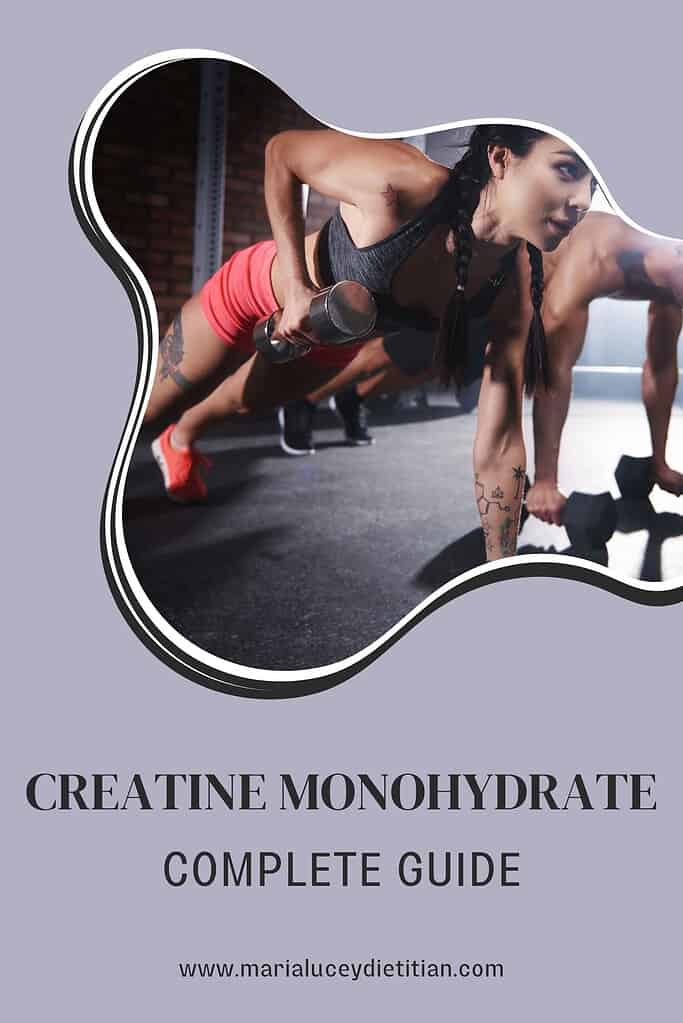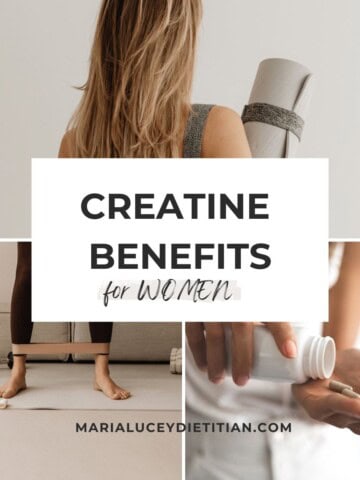Are you curious about creatine supplements? You're not alone. Creatine Monohydrate is one of the most popular but controversial dietary supplements on the market. Traditionally thought of solely as a sports supplement, in recent years, we have learned that creatine's benefits far exceed this.

This article is about creatine supplements, who can benefit from them, what to be careful of, and, most importantly, how to safely take them.
🎥Don't feel like reading? Watch this information on YouTube below
Jump to:
- Price Of Creatine Supplements
- What is Creatine?
- How does Creatine Work?
- When To Consider Taking Creatine Supplements
- What Is The Best Type Of Creatine Supplement To Take?
- Creatine Dosing & How Much To Take
- What Is The Best Time To Take Creatine?
- Is Creatine Safe?
- Will Creatine Cause Me to Gain Weight?
- What Happens When You Stop Taking Creatine?
- Connect with Maria Lucey, RD!
Price Of Creatine Supplements
My first point is that you do not need to go straight to a checkout to buy creatine. You will be perfectly healthy without it. It is a "nice to have" in my books in terms of its benefits for exercise performance. Yes, there are now benefits beyond this, such as mood, cognitive function, and memory, but nailing the basics of a well-balanced diet can be hard enough for many of us; we don't need to complicate it any further.
What is Creatine?
Creatine is an amino acid derivative made within our body. It is found naturally in our muscles and a small amount in the brain. We can also get creatine through our food.
It is not a steroid.
In simple terms, creatine is an energy source for the body;
The goal of taking a creatine supplement is to get your creatine stores as close to 100% saturation as possible. For most omnivores, creatine stores sit at around 60-80% full, and women tend to fall on the lower side of this range as they tend to have diets typically lower in meat than men. Vegetarians and vegans sit at stores of around 55-60%.
Supplementing with creatine can increase the creatine stores we have in our bodies by up to 40%.
As I said, creatine is found in food, particularly meat, fish, and dairy. However, the amount of creatine we eat in food isn't as much as you would think. One of the best sources of creatine is red meat, but you would need to eat approximately 1.3kg of beef to get the same amount of creatine as one scoop of powder.
Creatine supplements are among the most popular and widely researched dietary supplements on the market. So, unlike many other supplements, they are not just a product of marketing and influencer hype.
How does Creatine Work?
As I mentioned, creatine is an energy source for the body as it helps make adenosine triphosphate (ATP).
ATP provides immediate and short bursts of energy - so it's useful for explosive movements such as sprinting, & power-lifting
The body doesn't store much ATP, and when it's depleted, it takes time to build back up. But having good stores of Creatine is like a shortcut that boosts ATP without that waiting around lag time.
So, to clear up a major misconception about creatine, creatine itself does not make you more muscular. Instead, it helps provide your muscles with the energy to do more work, which can translate into being able to lift that little bit heavier and get in that extra set in the gym, which you may not have been otherwise able to do. And there is a lot of evidence to support creatine doing this.
When To Consider Taking Creatine Supplements
Scenario 1: To Enhance Exercise Performance:
There is good evidence for creatine supplementation if you are looking to:
- Increase your muscle mass and strength.
- If you want to improve performance during high-intensity exercise, particularly ones that have single outburst movements less than 30 seconds in duration, e.g. sprints, power lifts OR in sports that involve bursts of effort, e.g. tennis
- Recovery benefits. Creatine can reduce muscle damage and encourage greater replenishment of glycogen stores than carbohydrates alone, which is beneficial for endurance athletes.
However, with sports nutrition, you need to start with the basics, like eating enough to fuel your workouts in general, eating enough protein and training efficiently, getting enough rest, and so on. Again, there is no point in taking supplements unless you have the basics right first.
Now, if you are new to the gym, or maybe you have been working out for a while, but you still find it hard to be consistent with the basics, then I wouldn't be adding this additional layer on top. I've been going to the gym for years, and only now am I kind of like, you know what? Maybe I'll consider adding creatine to my routine because I've been taking my training a bit more seriously lately, and I’m generally quite consistent with all the other things.
You should think of a performance-enhancing supplement as icing on the cake. First, you need all the ingredients for the cake itself. Then, if you can get that cake out of the oven and in decent shape, you can consider putting icing on top. But if you're missing the other ingredients, you're just wasting your money and efforts with creatine.
Scenario 2. Mental Health And Mood
Since creatine plays a role in energy metabolism, there seems to be a connection between creatine and how well the brain is firing. There is now an established relationship between mood and the presence of adequate creatine in the brain.
Scenario 3. Cognition
Beyond mood, creatine may be beneficial for overall cognition and mental performance. Supplementation may help reduce mental fatigue and support normal memory functions, especially when under stress, such as sleep deprivation, mild exercise, and stressful mathematical tasks (like doing your tax returns, lol).
Scenario 4: Menopause
Menopause is a challenging time for women and their bodies. Estrogen levels are at an all-time low, making it more difficult for women to build or maintain muscle and keep strong bones.
So, creatine for women going through or post menopause is a viable option here. But I would prioritise making sure you are getting enough protein, calcium, and vitamin D, as well as resistance training first. Then, creatine could be icing on the cake.
Scenario 5: Aging
Now, with ageing comes muscle loss.
After the age of 30, we begin to lose 1% of muscle mass per decade, and as we get older, our bodies become less efficient at rebuilding protein. So, honestly, protein powders and creatine supplements have more of a place in nursing homes than in the gym bros' gym bags. These marginal gains are of most benefit to the older population.
But again, it is icing on the cake. Eating enough, eating protein and resistance training are the core building blocks as we age.
Scenario 6. Pregnancy
Now, there is also emerging positive evidence behind the role of creatine in pregnant people.
During pregnancy, creatine stores are reduced, and the fetus relies on its mother’s creatine throughout most of the pregnancy, which seems to play an important role in brain development. Animal studies are showing promising results. But at this time, we don't have evidence from human studies on pregnancy. However, there is a large one underway right now, and I am a prenatal specialised dietitian, so I'll be watching this space to help my pregnanct clients in the best way possible.
What Is The Best Type Of Creatine Supplement To Take?
So, there are several types of creatine (e.g., creatine monohydrate, creatine ethyl ester, buffered creatine, and creatine hydrochloride).
You can generally find it in a variety of forms, whether that’s a powder to mix with water, a chewable gummy, or capsules to take before a workout. I would say choose whatever works best for you. But if using it as a powder, it's best only to use it in cold drinks, not added to tea and coffee.
Now, always Choose supplements that undergo third-party testing for purity. Sadly, there is a lot of contamination in dietary supplements, and choosing a certified product is imperative in this case. Look for certifications by Informed Choice, USP or NSF for Sport.
I have a full post on the best creatine supplements, which i would recommend checking out if you are considering purchasing.
Creatine Dosing & How Much To Take
There are two ways to go about taking creatine:
Number 1 is a loading phase followed by a maintenance daily consistent dose.
Number 2 is simply starting at the maintenance daily consistent dose.
Loading isn't necessary, but it makes reaching peak creatine stores quicker.
So, if you decide to go by the loading approach, the recommendations are:
Loading Phase: 0.3 g/kg/day spread out over 4 doses for 5-7 days (or for most people around 20g/day) followed by a Maintenance Phase: 0.03 g/kg/day daily in one dose (or for most people 3-5 grams a day).
For the second method, you simply skip loading and go straight onto the maintenance dose.
Also, larger athletes engaged in intense training may need to consume more (5–10 g/day) creatine to maintain optimal capacity. Rugby players are an example.
What Is The Best Time To Take Creatine?
After exercise or with a Carbohydrate containing meal is the best time to help it get sucked up into the muscles, but in general, any time is still efficient.
Is Creatine Safe?
Creatine is very safe in itself. As I mentioned earlier, it is naturally produced in the body, and even if you over-supplement, any excesses will be excreted in your urine, so it's not a supplement I would ever worry too much about. Creatine monohydrate is the form most researched.
The dangers mainly come from taking a supplement that isn't third-party tested because then it could have all sorts of stuff added in. So get one that's third-party tested, ideally with the Informed-Sport or NSF-Certified logo.
Will Creatine Cause Me to Gain Weight?
This is the most common concern for women who are thinking about taking creatine. However, creatine does not increase your body fat.
However, it is true that some people experience an increase in weight when they start taking creatine, but this is related to a temporary increase in body water or water retention. Creatine does, in fact, increase your cellular hydration, but this is considered a positive side effect. You are actually better hydrated as a result.
What Happens When You Stop Taking Creatine?
Once supplementation is stopped, muscle creatine levels and body mass return to baseline after 4-6 weeks. So they don't suddenly drop off completely, and if you miss a dose one day or even for a few days, it's not something to worry too much about.
Connect with Maria Lucey, RD!
I hope you found this article helpful; if you have any questions, please comment below or reach out to me on social media.
Don’t forget to follow me on Instagram, YouTube, and Pinterest so you never miss a new recipe or blog post.
Other Articles You May Enjoy:
- Dietitian Reveals The Meaty Truth On The Carnivore Diet Plan: Is It Healthy & Sustainable?
- How Much Protein Do You Need? ALL Your Questions Answered with A Registered Dietitian
Check me out on YouTube!
🎥 Visit my YouTube Channel to learn more about my approach to eating and see many of my healthy recipes.





Leave a Reply